
Charles Calvert, PhD student in the BCRRE Power and Traction research group and Lead Systems Engineer for HydroFLEX takes us through the history of HydroFLEX and some of the key technical challenges the team resolved in order to take the train successfully onto the UK mainline – the first Hydrogen train ever to run on the mainline.
Last week, a team consisting of researchers from the Birmingham Centre for Railway Research and Education, engineers from Porterbrook and Jeff Vehicles achieved a new milestone in our hydrogen train development program: we took our HydroFLEX train out onto the mainline.
I have been researching hydrogen trains for the past 3 years as part of my PhD program, but BCRRE has been working on hydrogen trains for quite some time before this. In fact, the university’s first hydrogen train, Hydrogen Pioneer, was unveiled in 2012. This was a small-scale prototype, made for the inaugural Institution of Mechanical Engineers’ Railway Challenge, and almost resembles a train!
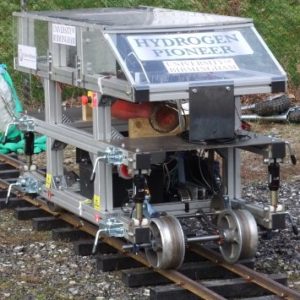
Hydrogen Pioneer – The UK’s First Hydrogen Train
The Railway Challenge is intended to enable early career engineers, researchers and students to experience working on a project to design, develop and present a business case for a narrow-gauge locomotive. There are a number of sub-challenges within the overall Railway Challenge which cover track-based aspects, a business case and the team’s presentation . Not only is this an enjoyable experience, those who take part quickly learn what it takes to bring an original product idea to operation in a rail environment.
The first locomotive consisted of a small fuel cell connected to a battery to make a hybrid traction system that powered the wheels via electric motors. Simple and effective, the Birmingham team demonstrated the possibilities of Hydrogen fuel-cell-based traction.
The hybrid system is different from a standard (self-propelled) train: a self-propelled train transmits power from a prime mover, such as a diesel engine, directly to the wheels via hydraulic or electric transmission. In a hybrid system, the power supply (e.g. an engine or overhead cable) charges batteries which, in turn, power the wheels via an electric motor. This means that the fuel cell in Hydrogen Pioneer could be used at its most efficient power state to continuously charge the batteries, whilst the batteries were used to meet the variable load of the electric motor to accelerate the train. The batteries also allow for energy to be recovered when braking. Both of these factors result in reduced hydrogen consumption overall, which is obviously beneficial for energy-efficiency.
Development of Hydrogen Pioneer continued as a test bed for cutting edge BCRRE research for academic projects, such as investigations into supercapacitor storage and silicon carbide inverters. Over the years the IMechE Railway Challenge vehicle was further developed and it was at the Rail Live show in 2018 that the locomotive, by then given a facelift and renamed Hydrogen Hero, caught the attention of Porterbrook, a company that owns and leases railway rolling stock.
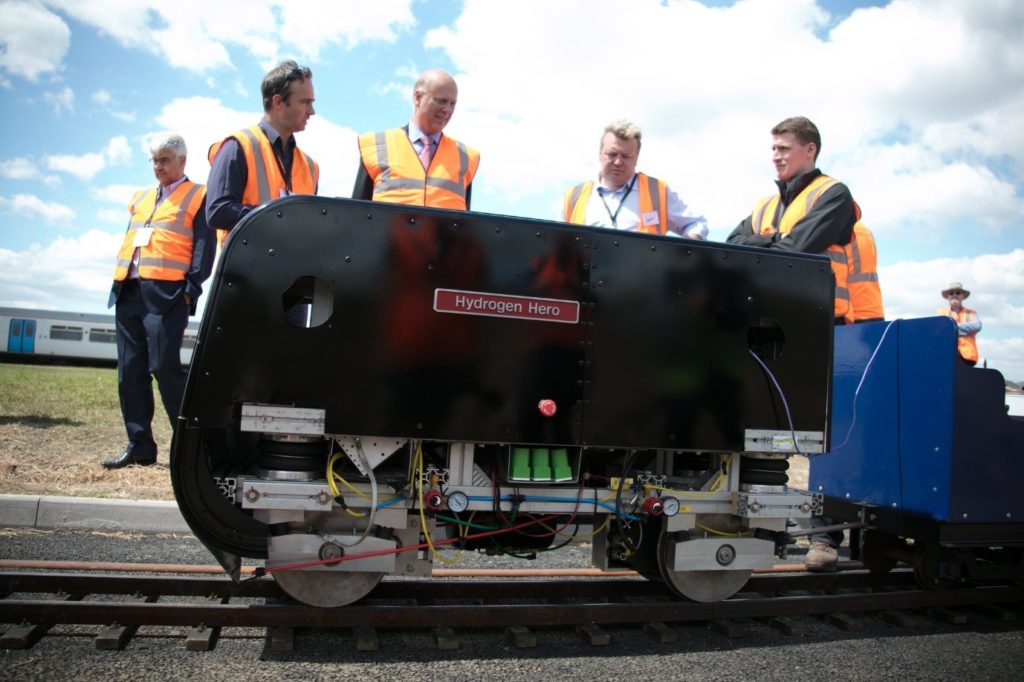
Between ourselves and Porterbrook, we decided to take one of their out-of-use Class 319 electric trains and fit it out with a hybrid, hydrogen and battery, drivetrain. We signed the collaboration agreement at September 2018’s Innotrans exhibition and got to work!
There were many technical challenges to overcome to scale up the size of the hydrogen system to power a full-scale train but over the course of 9 months we overcame them in time to demonstrate the train, named HydroFLEX, at Rail Live 2019.
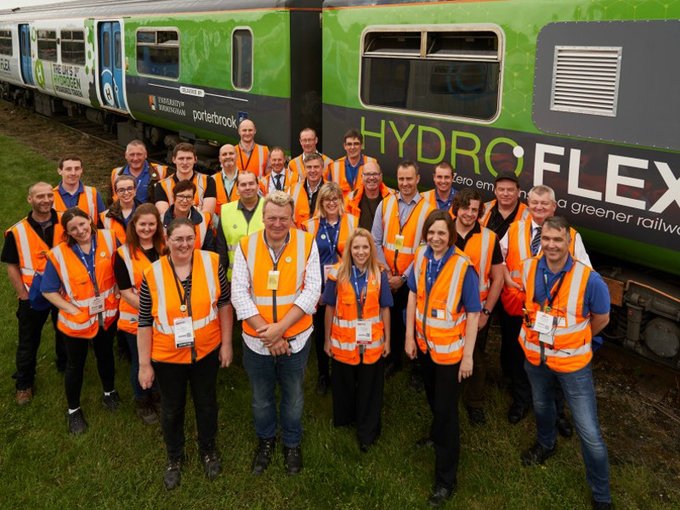
Over the past year, we’ve been working to improve and get HydroFLEX approved for mainline running. We automated the control system, upgraded the software and went through the rigorous effort (and many pages’ worth of paperwork!) to convince everyone that our train is safe to go on the mainline.
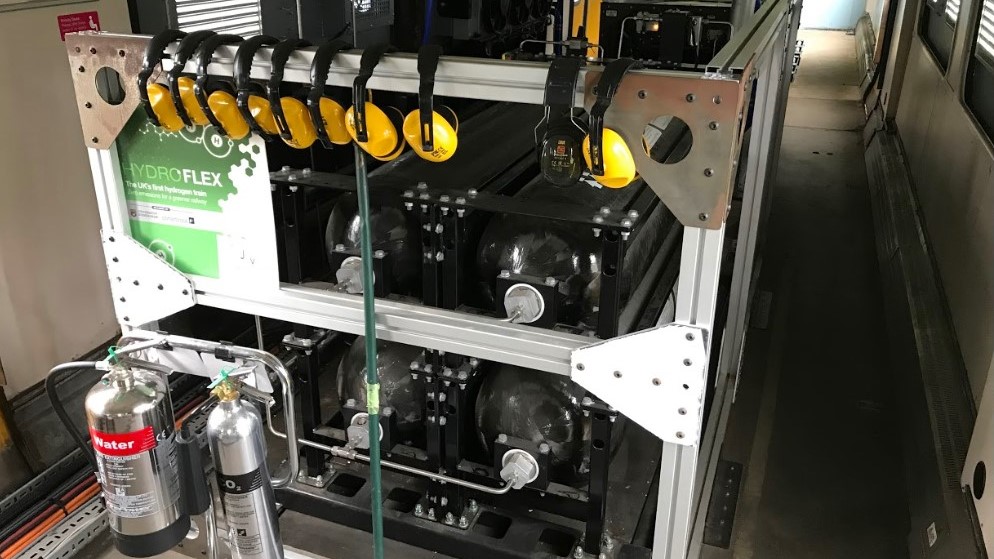
And here it is, crossing the Avon on its mainline run between Evesham and Long Marston.
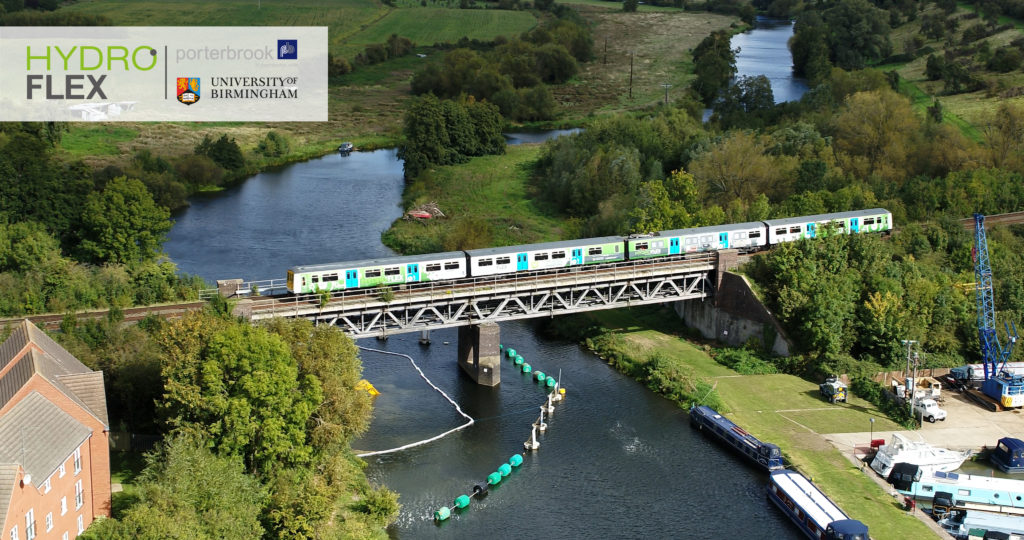
Getting the train out onto the mainline was a marvellous achievement and has attracted a huge amount of media attention. It is very gratifying that the reception has been so positive. It is my firm belief that we’ll have hydrogen trains in service before long and I expect BCRRE to stay at the forefront of the effort to make this happen. Our next steps are to continue developing the traction system, and we are looking forward to continuing to work with Porterbrook on the next stages of the Hydrogen locomotive journey. As one commentator put it, it’s the next-generation steam train!
Follow our progress towards further development of the hybrid Hydrogen-and-battery system and full commercialisation of this technology. Keep in touch via Twitter, LinkedIn and the BCRRE website.
P.S. The Railway Challenge team plans on taking part in the 2021 competition; if you’d like to sponsor the team, please contact me via railway@contacts.bham.ac.uk
You can also contact Charles directly at cxc035@student.bham.ac.uk
